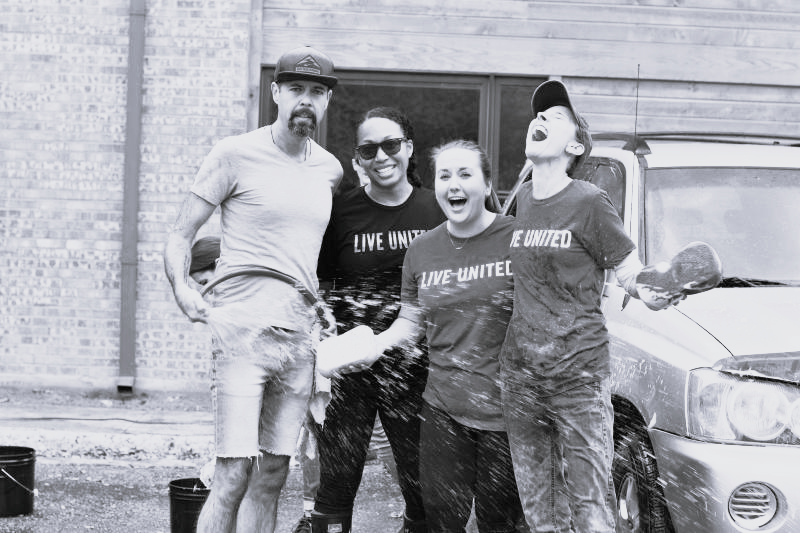Stuff That Works
‘Stuff that works, stuff that holds up
The kind of stuff you don’t hang on a wall
Stuff that’s real, stuff you feel
The kind of stuff you reach for when you fall’
Guy Clarke
There was never a moment where I thought to myself, ‘I want to be a fundraiser’.
Life is anything but scripted.
After finishing graduate school at Emory University in 1999, I moved 967 miles west to Austin. A move 1,293.8 miles away from my family in North Carolina, which was a big deal as a first-generation college student and bonafide mama’s boy. I might as well have stepped onto a rocket ship and shot myself toward the moon.
I headed west, completely unaware that Austin’s technology bubble was quickly deflating. The job market was flush with overqualified professionals looking for work and few opportunities. Without knowing a single human in a new city with a thick southern drawl, there was no red carpet to roll out. After a year of piecing together random jobs, from slinging ink in a local print shop to wrangling knee-highs as an elementary school substitute teacher, I eventually landed a seasonal role at United Way working with high tech companies on their employee giving efforts. And so, my journey in nonprofit resource development began.
Twenty-one years later, I’ve cobbled together a wide range of experiences in the field, from small startups to large and complicated enterprises. And despite the varied settings and circumstances, a short list of fundamental guiding principles took shape that inform my approach still today as I help nonprofits and corporations build more effective programs.
Don’t laugh at jokes that aren’t funny
The most important lesson I’ve learned throughout my career is this: do the hard work to figure out who you are, really, and then be that person all the time. I hate the word ‘schmooze’. It sounds gross just saying it out loud. Even grosser is the idea behind it, which according to Merriam-Webster means: ‘to talk with someone in a lively and friendly way, typically in order to impress or manipulate them’. Too often, development professionals feel the need to become shapeshifters or chameleons, agreeing with anything a prospective donor says, filtering their words, and laughing at jokes that just aren’t funny. Most humans have an innate and almost immediate sense when someone is being real with them and when they’re not. I’ve found that authenticity, being true to your own personality, character, beliefs, and spirit in all settings, is a superpower in development (and life for that matter). Folks may not always agree with you, but if they are confident that you can be trusted, real connection is possible. Figure out who you really are, be that person all the time, and don’t laugh at jokes that aren’t funny.
Standard Blue Crow Attire
Fundraising and development are not the same thing
Fundraising is simply the act of seeking financial support for a charitable cause. It’s transactional in nature, a game of numbers, and views others as a source of potential revenue. Development however, real development, is something different. To develop means to create something by deliberate effort over time. It requires careful watching and listening, collecting valuable information, reflection, thoughtful planning, and intentional action. It’s the work of identifying the right dots and connecting them in the right way at the right time. It requires patience. There is something uniquely organic and artistic about real development. It’s not simple and it often doesn’t happen quickly. There are no standard workflows or ‘moves-management’ templates that grow real, authentic relationships. And that’s the objective of real development: to deepen and intensify the passion a person has in their heart for your mission. Focus on the heart instead of the hip pocket. Fundraising and development are not the same thing.
There are no silver bullets
Real development is hard work. Over the past 20 years, I’ve oriented myself by focusing on the same North Star: developing long-term, sustainable relationships with other human beings. Building healthy relationships that last isn’t easy. It requires doing a lot of little things right over a long period of time. The key here is ‘time’. And although we can influence the pace at which they develop, a balance is required to ensure they remain authentic and evolve naturally. In my experience, patience pays significant dividends by reducing donor churn, increasing retention, and recurring investments. Be wary of impatient leaders and development professionals touting golden-roll-a-decks (I’m dating myself here), because there are no silver bullets.
Leadership Team Carwash
It takes a Village
Organizations with the most effective development programs understand that every single staff member and volunteer plays an integral role in generating revenue to advance their mission. It’s not the sole responsibility of a Chief Development Officer or particular department. Your development staff is, however, responsible for creating a plan that clearly articulates the roles others play and ensuring they are prepared to play them. The ‘golden equation’ in development is: the right person, asking the right person, for the right amount, at the right time, for the right thing. This often requires your development staff to become an orchestra conductor of sorts, responsible for figuring out how to best utilize all of the available people and resources. Sometimes they are at the table, on the call, or on the tour. And, sometimes they’re not. Highly effective development professionals and teams work as hard cultivating internal relationships as they do those with their donors, creating alignment and transparency with other departments. Only by creating a shared playbook and healthy internal relationships among finance, programs, operations, and marketing teammates can an organization consistently deliver a top-shelf experience for its supporters. It truly takes a village.
stuff that works
Stuff that works often isn’t complicated, but that doesn’t imply it’s easy. Authenticity, patience, and teamwork aren’t necessarily the first words that come to mind when one thinks of nonprofit development. However, they should be.


